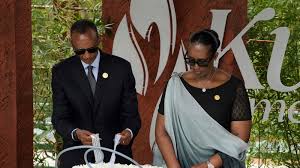As Rwanda solemnly commemorated the 30th anniversary of the devastating 1994 genocide, President Paul Kagame pointedly criticized the international community for its failure to prevent the massacre of an estimated 800,000 people by government-backed extremists. Despite Rwanda’s remarkable recovery and economic growth since then, scars linger, and questions persist about the extent of genuine reconciliation during Kagame’s lengthy rule.

Leading the somber commemorative events in Kigali, Kagame was joined by foreign dignitaries, including former U.S. President Bill Clinton and Israeli President Isaac Herzog. The genocide was triggered by the downing of a plane carrying then-President Juvénal Habyarimana, with Tutsis subsequently targeted in massacres led by Hutu extremists over 100 days. The international community has faced criticism for ignoring warnings about the impending atrocities, with some Western leaders expressing regret.
Kagame, speaking at a memorial site holding the remains of 250,000 genocide victims, shared personal stories, including that of a cousin whom he tried to save with the help of U.N. peacekeepers, to underscore the horrors endured by Rwandans. Despite strides in ethnic unity, with national ID cards no longer identifying citizens by ethnic group, Kagame’s government has faced accusations of silencing dissent through stringent laws and alleged human rights abuses.
Acknowledging Rwanda’s progress amidst adversity, Kagame emphasized the importance of unity in the nation’s journey towards healing and development. However, his leadership style has been criticized for stifling opposition and fostering a climate of fear. Moreover, tensions with neighboring countries, including Congo, Burundi, and Uganda, continue to pose challenges to regional stability.
While Rwanda has made significant strides since the genocide, the commemoration serves as a stark reminder of the atrocities endured and the ongoing quest for justice, reconciliation, and peace.


















